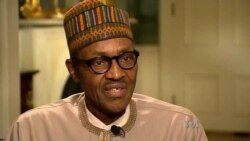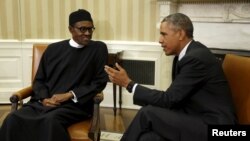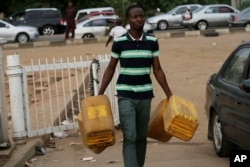Nigerian President Muhammadu Buhari said a regional joint task force to fight the militant group Boko Haram will be up and running by the end of this month.
Buhari told VOA in an interview Tuesday that Nigeria will lead the task force and troops from several of Nigeria's neighbors could be deployed in operations against the militants.
Buhari, who hails from northern Nigeria, where Boko Haram is most active, said there has been progress in the fight, but he refused to predict imminent victory.
“We have killed the commanders,” he told VOA. “Certain troops have been trained and the multinational joint task force, comprising of troops from Chad, Niger, Nigeria, Benin Republic, are being heard in the theater of operations, so really this is the practical and the realistic way the problem can be fixed.”
Cameroon is also contributing troops to the task force.
Meetings with Obama, Kerry
Buhari is in the middle of a four-day visit to Washington.
He met with U.S. Secretary of State John Kerry Tuesday, ahead of meetings with members of Congress and a town-hall meeting with Nigerians who live in the U.S.
On Monday, the Nigerian leader met with President Barack Obama at the White House.
Obama praised the recent election in Nigeria, which led to the first democratic transfer of power since the end of military rule in 1999.
The inability of Buhari’s predecessor, Goodluck Jonathan, to quell the six-year-old insurgency waged by Boko Haram was a key factor leading to Buhari’s election victory.
Buhari also held a meeting with Deputy Defense Secretary Bob Work, at which Work expressed condolences for Nigerians killed in recent Boko Haram attacks and applauded the president's leadership in addressing the threat.
Buhari also welcomed U.S. support for the joint task force working to fight Boko Haram in the Lake Chad area.
Cabinet reshuffle
In one of the most dramatic moves in the Boko Haram fight to date, Buhari this month sacked the chiefs of the army, navy and air force.
He appointed a new defense chief, and a new security chief who hails from Borno, the state most effected by Boko Haram’s violence.
Nigeria has been hoping to acquire more military aid, including helicopters, but the Obama administration has been reluctant to provide them because of charges the Nigerian military has been involved in human rights abuses and extrajudicial killings.
Many Nigerians had hoped the tide had turned against Boko Haram militants in the weeks leading up to the election, as Nigeria’s security forces brought in foreign mercenaries from South Africa and Ukraine to fight, and troops from neighboring Chad and Cameroon notched key victories.
But the group, which has allied itself with the Islamic State movement in Syria and Iraq, has proven a stubborn foe.
Last week, its fighters killed dozens of people in bombings in several towns while Muslims prepared for holiday celebrations marking the end of Ramadan.
While violence in the north has been a persistent problem, the country faces other major concerns, including a precipitous drop in price of its largest hard currency export -- oil.
Electricity shortages are common in many Nigerian cities, and Buhari rebuffed suggestions that he and the ruling party, known as the All Progressives Congress, were moving too slowly to name a cabinet.
“Why so much pressure being brought on APC to act with immediate effect when there are so many things wrong?” Buhari asked.
Corruption
Buhari pledged to move forward on cleaning up corruption, particularly in the oil industry, which is a massive source of revenue for Nigeria and which has long been rife with siphoning and, more recently, theft by smugglers using illegally registered tankers.
Earlier this week, he signed a decree blacklisting more than 100 ships allegedly involved in oil smuggling; he also said the state-run Nigerian National Petroleum Corporation may have been involved in forging export documents.
“Certainly [Nigerian oil officials] can’t say they are loading Nigerian crude into an unknown unregistered ships, so there is a lot of disrespect for the laws of the country that had been taking place for more than 10 years and that shouldn’t frustrate us, or stop us from operating,” said Buhari, a former top oil industry executive.
“We just grow our lines, we continue, but wherever we uncover that public funds has been siphoned, or crude has been stolen, we will trace it through the movements of the ships, through the accounts of people it went through,” he said. “This cannot be done overnight."







